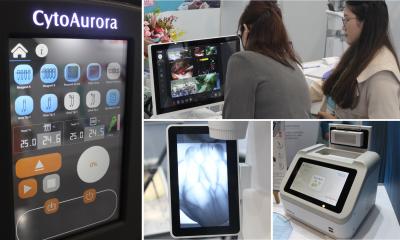The American Association for Clinical Chemistry 2013
According to Molly Polen, at the AACC, great opportunities lie ahead for laboratory medicine and, to seize them, ‘meeting with colleagues and learning about new technologies is a critical first step. The 2013 AACC will provide these and other opportunities, such as informative sessions and live demonstrations of new technology.’


Scientific programme topics include the role of insulin in the brain; relevance of ‘junk’ DNA to human development; how much vitamin D is needed for bone strength, and the importance of patient-based therapeutic discoveries. The AACC is also collaborating with Texas Medical Centre – the largest medical complex in the world – with sessions highlighting some of its latest findings.
Conducted in Spanish for the first time, three sessions will focus on improving patient care, what vitamin D assays really mean, and biomarkers for Alzheimer’s. An additional session will look at how clinical labs in developing countries can meet their unique challenges.
On the expo side, all attendees will receive an e-mail that lists contact information for the booths they visited. ‘They no longer have to worry about keeping scraps or business cards,’ Molly Polen pointed out. ‘They can consider purchasing decisions in their own offices, with no chance of losing information.’
Worth attending is the AACC’s annual New Product Review, which many companies use to reveal new findings and products.
‘Attendees should look forward to visiting Houston, rated by the New York Times as one of its 46 places to visit in 2013,’ said Polen. ‘Expect excellent dining, and cultural opportunities such as the Museum of African American Culture, and the Asia Society Texas Center, as well as the Houston Museum of Natural Science,’ she said. ‘It promises to be a great meeting with something for everyone!’
Exhibitors you should visit in Houston:
Siemens Healthcare Diagnostics (Booth 3449) will unveil its latest clinical diagnostics innovations, from new assays and automation to digital microscopy, and present a new workflow management solution for labs of all sizes and budgets.
Greiner Bio-One North America, Inc., (Booth 4511) from Monroe, North Carolina, provides product manufacturing, distribution logistics and product application support to clinical and research laboratories at universities, start-up companies, and to the world’s largest hospitals, pharmaceutical and biotechnology corporations. The firm’s products relate to collection of human samples and plastic labware specifically related to medical research.
Beckman Coulter (Booth 4751) will showcase scalable laboratory solutions for labs of all sizes – the community hospital, core, reference lab – and also feature total lab automation solutions, small footprint solutions and newest portfolio additions, including recently acquired IRIS Diagnostics automated urinalysis products.
Roche Diagnostics (Booth 4049) will showcase its comprehensive solutions portfolio from labs to hospitals, clinics and patient homes. Visitors will have the opportunity of being introduced into a total automated modular laboratory solution. Two workshops on Tuesday, July 30th, will highlight best practices for improved cardiac testing workflows in the hospital and trends about diagnosis and treatment of Hepatitis C in the US.
03.07.2013





